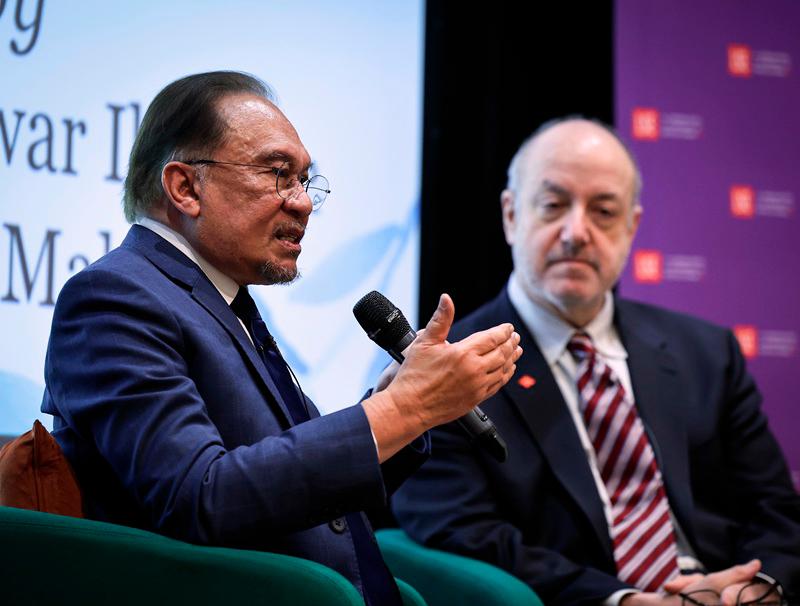LONDON: As chair of ASEAN in 2025, Malaysia will seek to rejuvenate key mechanisms like the ASEAN Plus Three and the East Asia Summit (EAS), both of which have been celebrated for their convening power but remain underutilised, Prime Minister Datuk Seri Anwar Ibrahim said.
He said EAS is the only regional forum dedicated to strategic and security issues in the Southeast Asian region that is led by leaders, and where rival powers meet in a neutral setting.
“Instead of getting bogged down by the disputes of major powers, we would rather work with like-minded member states and dialogue partners to seek ways on how such mechanisms can deliver on its aspirations,” he said in his lecture at the London School of Economics today.
The lecture, entitled “The Adaptive Edge: Malaysia’s Global Strategy in an Uncertain Era”, was attended by about 500 students.
The rejuvenation of these mechanisms is part of Malaysia’s strategy as the country aims to remain dedicated to fostering shared growth, bolstering regional cooperation, and maintaining its openness to trade, development and commerce.
“This will entail promoting an inclusive and sustainable approach to peace and security in our immediate region, and beyond,” the Prime Minister said.
Second, Malaysia will continue its open and pragmatic approach in engaging both the United States (US) and China, where relations are anchored in mutual respect and shared interests.
“In spite of all that talk of Malaysia pivoting towards China, the fact is that the US continues to reign supreme, cumulatively, as the largest source of foreign direct investment in Malaysia, especially in the tech-sector,” said Anwar, who is also the Finance Minister.
China, on the other hand, has been Malaysia’s largest trading partner since 2009, marking 16 years of thriving trade relations that have been pivotal in driving the nation’s economic growth, he said.
“It’s as clear as day that there is no zero-sum game here,” Anwar said.
In his view, maintaining robust ties with both the US and China is not merely a matter of economic pragmatism, but a strategic imperative to safeguard our national interests in an increasingly volatile world.
“By cultivating a balanced and constructive engagement with both, Malaysia ensures a diversified economic base, reduced overdependence, and a strengthened position as a resilient, open and competitive economy,” he said.
Thirdly, Malaysia will ensure that its position as a centre of competitive trade, finance and tech can withstand the changes around it, Anwar said.
Citing Daron Acemoğlu and James Robinson’s Nobel Prize-winning work on institutions and governance, he said it is a reminder that “poor countries are poor because those who have power make choices that create poverty, or as Piketty would have it: capitalism causes poverty by concentrating wealth in the hands of the few. The situation becomes perverse when it dawns on us that ‘socialism is for the rich while capitalism is for the poor!’
“To my mind, while there is some truth in these platitudes, we should be wary of succumbing to gross generalisations,” he said.
He noted that he has on previous occasions spoken of “the marauding Europeans’ in Asia’s chequered colonial history, leaving behind a trail of looting and plundering of the wealth and resources of the colonies.”
“Today, marauders may still be on the prowl though they may no longer be ‘geographically’ marked out because, whether from the West or from the East, ‘those who have power’ may be states, corporations or even individuals or non-state actors,” he said.
Anwar said that at the end of the day, it is up to the nations themselves, particularly developing countries, to acknowledge the broader structural challenges faced.
“Be that as it may, the central insight remains – nations thrive when the state is both accountable and inclusive, fostering institutions that earn, sustain, and promote public trust,” he added.









